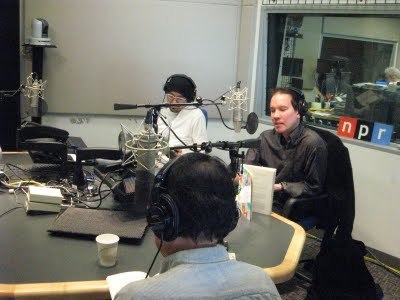Roland Kelts's Blog, page 72
May 11, 2011
Monkey decompression w/martini
May 10, 2011
Motoyuki Shibata in Paper Sky magazine
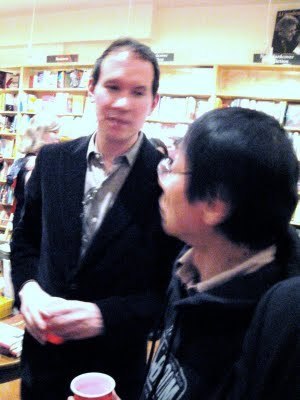
Roland Kelts: When you're traveling, are you able to translate and write as easily as you do at home in Japan?
Motoyuki Shibata: Oh, even better.
RK: How so?
MS: Well, let's say I'm in a park, or in an open air café, and I'm translating something, and people are talking around me. In a Tokyo park, they would be speaking Japanese, so I would be catching all of their comments and that would interfere with my translation work. But if I'm overseas, I would be hearing English conversation, and if I don't concentrate, I wouldn't know what they were talking about. Just sounds—like nice background music.
Read the rest online here.
May 9, 2011
Monkey Biz on NPR today
May 4, 2011
Japan Society final Monkey Biz event, NYC
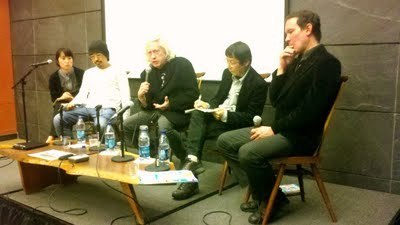 Translator Chisato, Hideo Furukawa, Steve Erickson, Motoyuki Shibata, Roland Kelts @ The Japan Society, Tuesday, May 3, 2011.
Translator Chisato, Hideo Furukawa, Steve Erickson, Motoyuki Shibata, Roland Kelts @ The Japan Society, Tuesday, May 3, 2011.
May 3, 2011
Join us tonight @ Japan Society, NYC; Final MB event
Tuesday, May 3, 6:30 PM
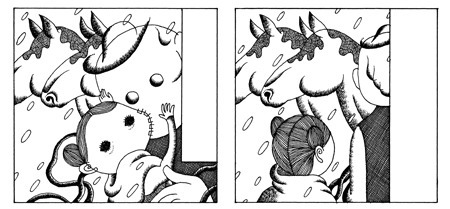

American and Japanese artists have been inspiring each other for decades. Tonight, authors Hideo Furukawa and Steve Erickson share their strong apocalyptic imaginations, and Roland Kelts, half-Japanese author ofJapanamerica, will discuss the mutual influences in narrative visual art. Haruki Murakami's love of F. Scott Fitzgerald and Raymond Carver is well known; Susan Sontag and Paul Auster have professed their love of the filmmaker Yasujiro Ozu, and Ozu's seemingly quintessentially Japanese films were created after he immersed himself in Hollywood movies during the war. American comics and animation by Walt Disney, Max Fleischer and others were transformed by Japanese artists into manga and anime, which now enjoy an enormous following among American youth. The panelists discuss how and why as they launchMonkey Business International, the first trans-national literary journal with fiction, poetry and manga from both nations. The influence has entirely been mutual, and they will discuss and contextualize contemporary Japanese visual and narrative culture.
Followed by a reception.
TICKETS
$12/$8 Japan Society members, seniors & students
Buy Tickets Online or call the Japan Society Box Office at (212) 715-1258, Mon. - Fri. 11 am - 6 pm, Weekends 11 am - 5 pm.
May 2, 2011
Monkey Biz launch 2 @ BookCourt in Brooklyn
One more event tomorrow.
 Monkey Biz wine.
Monkey Biz wine.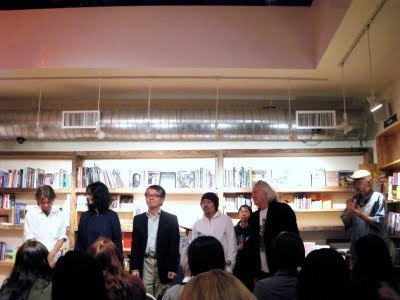 The readers: Rebecca Brown, Hiromi Kawakami, Minoru Ozawa, Hideo Furukawa, Motoyuki Shibata, Steve Erickson and Ted Goossen.
The readers: Rebecca Brown, Hiromi Kawakami, Minoru Ozawa, Hideo Furukawa, Motoyuki Shibata, Steve Erickson and Ted Goossen.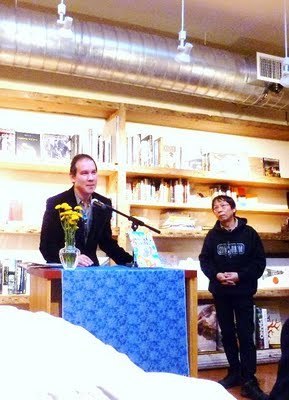 Old geezer and Shibata.
Old geezer and Shibata.
May 1, 2011
Monkey Biz launch event # 1
Order issues online here .
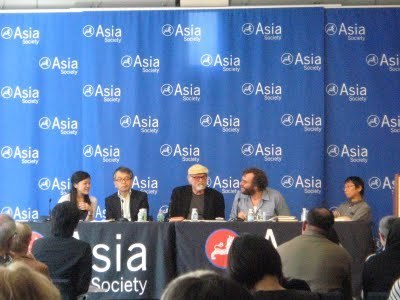 Hitomi Yoshio, Minoru Ozawa, Ted Goossen, Joshua Beckman and Motoyuki Shibata @ Asia Society, NYC.
Hitomi Yoshio, Minoru Ozawa, Ted Goossen, Joshua Beckman and Motoyuki Shibata @ Asia Society, NYC.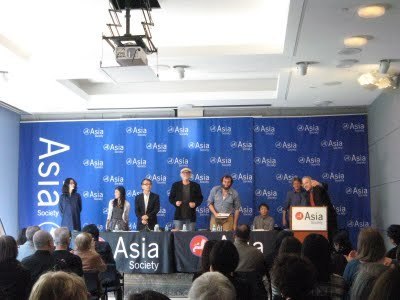 Hiromi Kawakami, Hitomi Yoshio, Minoru Ozawa, Ted Goossen, Joshua Becman, Motoyuki Shibata, Rebecca Brown and Asia Society Executive Director Michael Roberts.
Hiromi Kawakami, Hitomi Yoshio, Minoru Ozawa, Ted Goossen, Joshua Becman, Motoyuki Shibata, Rebecca Brown and Asia Society Executive Director Michael Roberts.
April 29, 2011
The Monkey in The Common
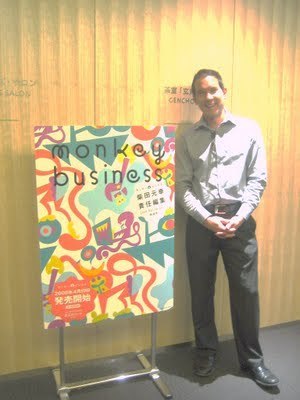 VOICES FROM JAPAN
HANNAH GERSEN
VOICES FROM JAPAN
HANNAH GERSENApril 29th, 2011 | 4:26pm
Aside from Haruki Murakami, much of Japanese writing remains unknown in the U.S., simply because it is not translated into English. Now, thanks to collaboration between the Brooklyn-based literary magazine, A Public Space, and the Tokyo-based literary magazines, Monkey Business, a special English-language edition ofMonkey Business is available in the US. This special edition, called "New Voices from Japan", will showcase the best of the magazine's first three years of publication and will include stories, poetry, and non-fiction, including an interview with Murakami.
As Stuart Dybek writes in a letter introducing the issue: "The books and anthologies that line my shelves attest to the fact that we live in a golden age of translation. Even so, it's rare to have a literary magazine like Monkey Business appear in English. It arrives with the sense of discovery and immediacy that one reads literary magazines for."
Brooklyn's Book Court, beloved independent bookstore and host of The Common'supcoming New York City reading event, will celebrate the publication of Monkey Business: New Voices from Japan this Sunday, May 1, at 7 p.m. with a party and reading featuring Japanese contributors Hiromi Kawakami, Hideo Furukawa, Minoru Ozawa, and Monkey Business founder and editor Motoyuki Shibata. The magazine's American writers, editors and translators will also join. It's a unique chance to meet the creators of Monkey Business: New Voices from Japan, and to pick up copies of the magazine. Additionally, twenty-five percent of all MB sales will go toward the Nippon Foundation/CANPAN Northeastern Japan Earthquake and Tsunami Relief Fund.
Roland Kelts, one of Monkey Business's contributing editors and author ofJapanamerica, a book about the invasion of Japanese pop culture in the US, answered a few questions for The Common about contemporary Japanese literature and its emerging writers:
How would you characterize Japan's current literary culture? Its contemporary literature? Are there any interesting trends emerging?
A lot of writers in Japan seem to be exploring what we might call the 'surreal,' dreamlike nature of contemporary life in an attempt to come to grips with a profoundly advanced, hyper-developed urban nation. And I think the incursion of technology and an 'always-on,' eerily connected yet isolating world makes their work seem particularly apt and insightful. Younger writers in particular feel intimately attuned to our age of exhaustion and repetition. Hideo Furukawa (novelist, author of Thirteen and Belka, Why Don't You Bark?) for example, imagines a Tokyo inhabited mostly by monsters—who nevertheless feel more sensitive than the humans around them. Of course, Haruki Murakami was onto this trend years ago, which is why his work feels so relevant wherever you are—in NYC, Shanghai, Moscow or Tokyo. [more HERE]
April 28, 2011
Monkey Business updates
Press on the events can be found here , here and here .
The Monkey just got its own Facebook page here--and you can order the issue at any hour of the day, wherever you happen to be, right here .
Hope to see you soon in NYC.
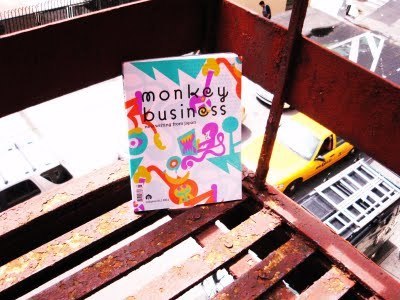
April 27, 2011
Interview with 'Japanamerica' author Roland Kelts on 'Monkey Business' - New York japanese culture | Examiner.com
Interview with 'Japanamerica' author Roland Kelts on 'Monkey Business'
Taking its name from the immortal Chuck Berry tune, the debut English-language edition of Monkey Business: New Voices from Japan is based on the annual Tokyo-based Japanese literary magazine founded in 2008 by award-winning translator, scholar, editor and author Motoyuki Shibata, one of Japan's best known and most highly regarded translators of American fiction. The first installment offers poetry, Kafka-adapted manga, a wide-ranging, in-depth interview with Haruki Murakami, and much more. And despite its mischievous title, twenty-five percent of all Monkey Business sales will go toward the Nippon Foundation/CANPAN Northeastern Japan Earthquake and Tsunami Relief Fund.


